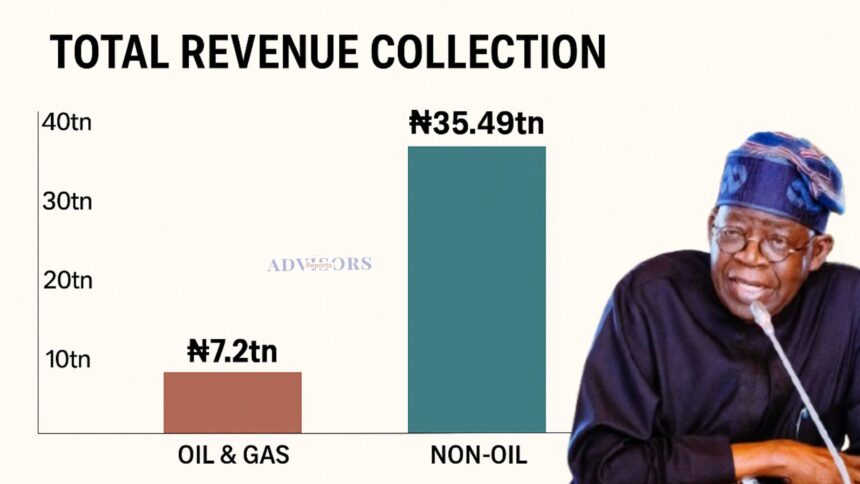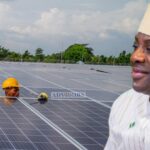…as report puts non-oil and oil revenues at ₦35.49trn, ₦7.2trn, respectively
Oredola Adeola
Despite increased oil production through mid-2025, President Bola Tinubu has announced that Nigeria met its 2025 revenue target as early as August, attributing the milestone largely to gains from the non-oil sector.
The President disclosed this on Tuesday at the Presidential Villa, Abuja, during a meeting with founding members of the defunct Congress for Progressive Change (CPC) and The Buhari Organisation, led by former Nasarawa State governor, Umaru Tanko Al-Makura.
Tinubu explained that recent economic reforms aimed at stimulating non-oil industries had significantly boosted government earnings, reducing dependence on oil revenues.
While the President did not disclose specific figures on the revenue milestone he announced, independent checks by Advisors Reports show that the Federal Government had projected ₦41.91 trillion in total revenue for 2025, against a planned expenditure of ₦54.99 trillion, leaving a deficit of ₦13.08 trillion.
Available data as of August 2025 indicated that Nigeria maybe on track to meeting this target
During the period, non-oil revenue sources had emerged as the dominant driver of government earnings, contributing more than 80% of total collections.
Whereas, despite improved crude production and higher receipts from mineral resources sales, the oil and gas sector accounted for less than 20%.
According to fiscal data, non-oil revenues, including tax collections and inflows from key agencies, stood at ₦35.49 trillion in the first half of the year.
In comparison, oil and gas earnings, estimated at about ₦7.2 trillion for January to August, trailed significantly behind.
Combined, both revenue streams amounted to ₦42.69 trillion, reinforcing President Bola Tinubu’s assertion.
BREAKDOWN
Further analysis by Advisors Reports showed that gross collections as of mid-2025, stood at ₦35.49 trillion, comprising ₦14.27 trillion in tax receipts and ₦21.22 trillion from major revenue-generating agencies including FIRS, Customs, and NUPRC.
Tax performance was particularly strong, with ₦14.27 trillion collected in the first half of the year—representing a 43% year-on-year increase and already surpassing the 16.4% growth target.
This also means more than half of the ₦25.2 trillion annual tax target had been realized by June.
On the mineral resources (oil and gas) side, Nigeria recorded an average production of 1.71 million barrels per day (bpd) in mid-2025—a 9.9% increase from 1.56 million bpd in July 2024.
This comprised 1.507 million bpd of crude oil and 204,864 bpd of condensates.
Industry data further shows that oil output at certain points surpassed 1.8 million bpd, averaging 1.78 million bpd, as pipeline integrity approached 100%, reducing leakages and enhancing revenue reliability.
Revenue performance in this period, reflected this improvement.
Nigeria generated ₦5.21 trillion from oil sales in the first half of 2025 (January–June).
In June alone, the oil and gas sector delivered ₦1.011 trillion in gross revenue, according to the Office of the Accountant General of the Federation (OAGF).
Based on this trend, and assuming similar levels of performance in July and August, estimated oil revenue through August could have reached around ₦7.2 trillion—a rough approximation that strengthens the government’s claim of meeting its overall 2025 revenue target ahead of schedule
President Tinubu while addressing the Al-Makura- led Buhari’s organisation, said that the economy was heading in the right direction.
“The economy is now stabilised. Nobody is trading pieces of paper for foreign exchange (forex) anymore.
“The economy is now predictable.
“When I took over, it was N1,900 to a dollar, it’s been stabilizing there.
“You do not need to know the Yemi Cardoso, Central Bank of Nigeria (CBN) Governor, to obtain foreign exchange or import goods.
“What we need now is building the ship and the vessels for the export of our goods and creating more jobs for our people,’’ the President noted.
Tinubu said the federal government will establish agricultural mechanisation centres in all regions of the country to build capacity, expand cultivation and harvest, and guarantee food sovereignty.
“We are going to have trainees. That programme is our path to food sovereignty, ” the President said.




